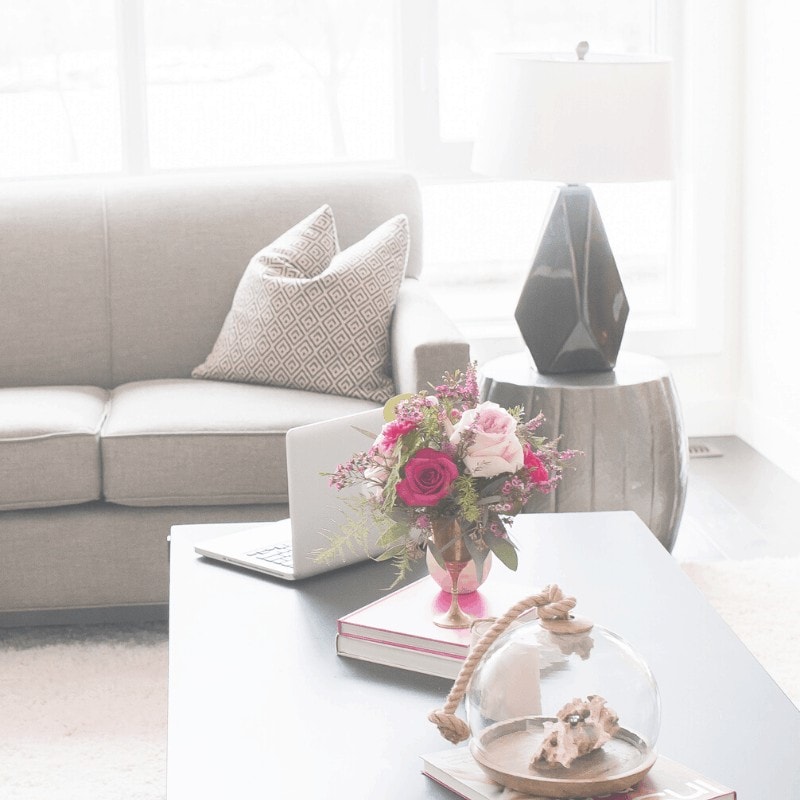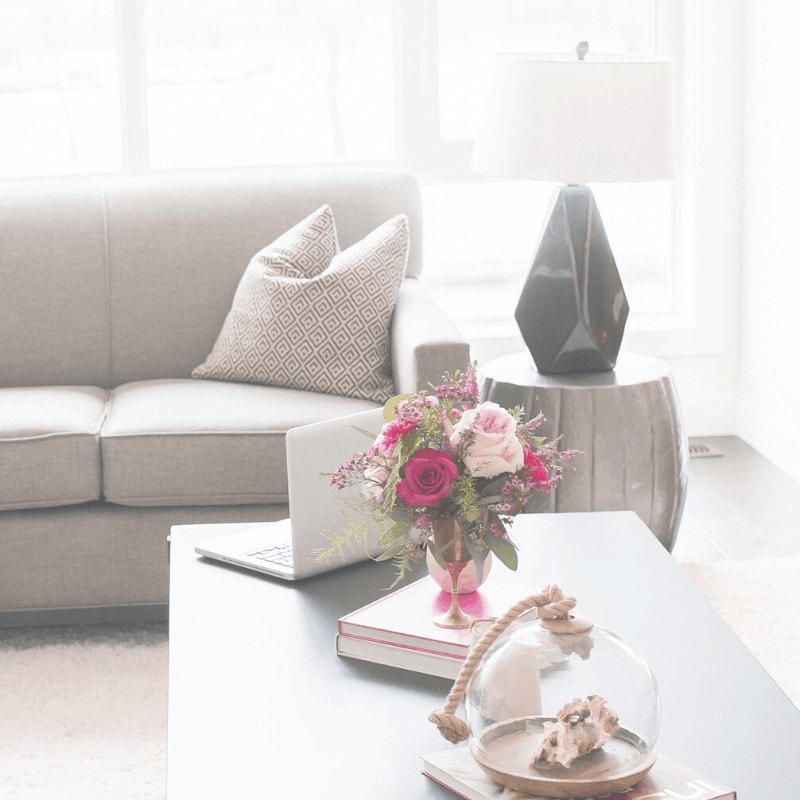Inside: Owning too much clutter can have a negative impact on your home and life. Keep reading to learn about the many benefits of letting go.
A decade ago, I lived in a constant state of exhaustion. My stress levels were through the roof, and I felt trapped because I had too much stuff and too many responsibilities. Change felt impossible, until I learned about decluttering, and my eyes opened to a powerful tool for reclaiming my home and life.
If you can relate, then I invite you to learn more about the amazing benefits of decluttering, along with tips that have helped hundreds create clutter-free homes. There’s never been a better time for a fresh start.

What Are the Benefits of Decluttering?
When you have less clutter, there are practical benefits, financial benefits and even mental health benefits. Here are the six that have the biggest impact on my daily life.
1. A decluttered home is easier to clean
This is an obvious benefit of decluttering: when there’s less stuff in your home, it’s easier to take care of!
Everything from vacuuming to dusting to laundry—a clean home is easier to maintain when there is less stuff to deal with. And for me, it’s more than just a convenience. I have asthma and a severe allergy to dust mites, which makes maintaining a healthy environment essential.
Plus, I have two kids, a small business to run, and it keeps me busy. I’d rather spend any extra time with my family or relaxing, instead of constantly tidying up or shifting piles of excess stuff.
For more on what this looks like in real life, be sure to check out my minimalist cleaning routine.
2. Decluttering helps you focus on what matters
When your home and life are cluttered, you’re more likely to feel overwhelmed. More stuff equals more demands on your attention, and it’s difficult to focus because you feel pulled in all directions. Everywhere you look — from your junk drawer to your messy closet —your physical clutter is a reminder of things that need to get done.
You might be so used to it that you don’t realise the impact your physical environment has on your mind. But a study at the Princeton University Neuroscience Institute has shown “our brains like order, and that constant visual reminders of disorganization drain our cognitive resources and reduce our ability to focus.”
In layman’s terms, this is how that “drain on my cognitive resources” felt for me:
I would stay busy, and always be doing things, but at the end of the day, I was never satisfied. I’d go to sleep wondering why there was never enough time for the things that matter—things like real conversations with my husband, taking care of myself, or just finding a few minutes for a good book.
I thought the problem was a lack of time, but in reality, I needed more focus and less distractions. If I wasn’t constantly tripping over stuff and putting out proverbial fires, I would have had the mental space needed to recognise and act on my priorities.
It’s a subtle difference, but with fewer things, I had a more relaxed mind, and suddenly there was always time for the important things.
3. You save time and money
When you declutter, you spend less time caring, cleaning and searching for your stuff (let’s be honest … when you own a lot, you spend a lot of time trying to find missing things!)
You also save money—you’re not accidentally buying duplicates because you either can’t find or remember what you already own, and you’re not spending money on storage either.
But it’s more than that. I also found that going through the decluttering process had a profound effect on the way I thought about new stuff. Dealing with a lot of clutter opens your eyes to how much waste we have in our homes, and how much money we’ve spent on what are ultimately unwanted items.
In other words, the act of decluttering taught me how to stop buying stuff I don’t really need, and it’s how I went from shopaholic to minimalist in just a few years.
RELATED POST: How Minimalism Helped Me Become Debt Free
4. Less stuff leads to less stress
When you look around your home, and it’s cluttered, what are you really seeing?
Odds are, it’s a lot of stuff that you don’t know what to do with. There are random cords that you *might* need someday (although you’re not sure what for), and there’s an old dress with the tags still attached—and you’re certain it will be worth something if you ever get around to selling it.
Sound familiar? If so, whether you realise it or not, these unmade decisions are weighing you down.
Sure, they might be small—but think about how much unnecessary stuff you own. You can hide it in the back of your closet, but it’s still in the back of your mind, and, undoubtedly, causing you stress.
Decluttering is a tool that creates peace of mind by not only creating physical space but also mental space.

5. Decluttering creates confidence
One of the surprising decluttering benefits is that it leads to more self-confidence.
Here’s the thing—whether we want to acknowledge it or not, we tend to buy, keep, and do things because of the stories we tell ourselves. Your old college textbooks might make you feel intelligent, a designer handbag might make you feel successful, and going to happy hour every Friday night might make you feel well-liked.
These stories can make it difficult to let go. After all, what will happen when we don’t have “stuff” to prove our self-worth?
It’s scary, but I’ve learned that when you find the courage to declutter your life, you stop being defined by what you own and what you do. You’re forced to present your true self to the world, and this creates self-confidence. You feel empowered to live freely and authentically, without hiding behind a mask of clutter.
I actually recorded a podcast episode about this, breaking down the relationship between my minimalist wardrobe and self-acceptance. But in summary, letting go of the past (and the material things that were a bit part of that) led to a sense of accomplishment, and I was able to step forward with my head held high.
RELATED POST: Why Your Life is Busy + Cluttered (Plus What to Do About It)
6. Decluttering teaches you to make intentional choices
Finally, decluttering teaches you to think intentionally about how you make choices.
Think about the process—you go through everything you own and systematically, decide what’s worth keeping. You’ll probably ask yourself decluttering questions like:
- Why do I own this?
- How is this adding value to my life?
- Why should I keep this?
Do this over and over, and with time it becomes a habit. You start applying this mindset to all areas of your life—everything from your schedule to your spending and even your relationships—you ask yourself, “What’s adding value and what’s not?”
You’ll start to see everything with new eyes, and this is when the magic starts to happen!
RELATED POST: Decluttering: How to Decide What to Keep?
Can Decluttering Change Your Life?
Hopefully, this list has convinced you that decluttering can absolutely change your life.
The simple act of letting go is about so much more than just “getting rid of old stuff”—you’re also letting go of fears, expectations and insecurities. You’re creating freedom, learning new ways of thinking, and essentially reclaiming all areas of your life.
If you’re still not convinced, I’ve written extensively about my own minimalist journey. Here are a few personal posts you might enjoy:
How to Get Started With Decluttering
Are you ready to get started with decluttering? If so, I invite you to download a copy of Mindful Decluttering, my step-by-step decluttering guide and workbook.
Simply subscribe using the form below for your free copy—and as an added bonus you’ll also get regular newsletters with more decluttering tips, resources and inspiration.
You might also find the following articles helpful:
Do you struggle to declutter clothes? Be sure to check out my ultimate guide to closet decluttering.
What benefits of decluttering have you experienced in your life? Or if you’re new to decluttering, what are you most excited about? Let us know in the comments! x
